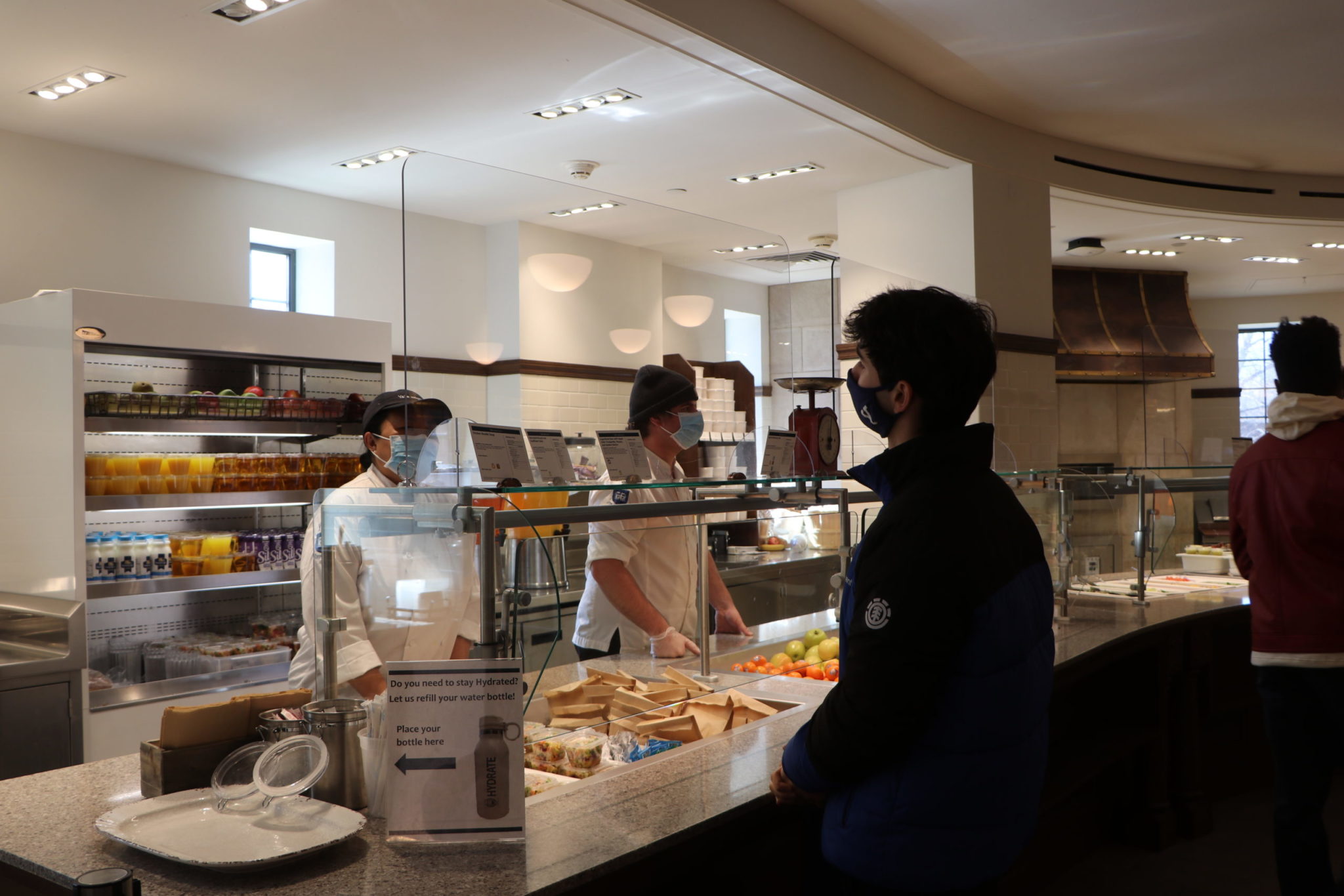
Vaibhav Sharma, Photo Editor
Transitioning from self-serve, buffet-style dining hall meals to meals prepared to-go this year has presented an additional challenge to some on-campus students with dietary restrictions.
Some students with allergies and other dietary restrictions have found that their options at the dining halls are more limited, while representatives from Yale Hospitality emphasized that students are encouraged to take advantage of various options to accommodate their individual dietary needs.
For lunch and dinner, each residential college dining hall serves a standardized rotating menu of two hot entrees and sides — one set vegan, one not — as well as salad, soup and other grab-and-go options.
“It’s been quite difficult to get good food this year, since I don’t eat pork,” Leart Ajvazaj ’23 said. “There’s only two entree options to begin with, so if the non-vegan option is pork, I don’t have much of a choice.”
Ajvazaj said that ordinarily, the Stiles pizza and grill always provided him with reliable alternatives in the event that he could not eat the daily entrees. Now, he is opting to order food from local restaurants more frequently than last year, and sometimes wonders if the limited menu offerings are the source of recent bouts of fatigue.
Ajvazaj told the News that he once almost ate pork since the food label was not next to the dish. Now, he makes sure to use the dining hall app to know what is being served before each meal.
David Foster ’24, who helped design Yale Menus, a student app that displays dining hall menu offerings, ingredients and allergens, noted that he has found it challenging to eat in the dining halls because he has several common allergens.
“There are definitely meals where the selection of options stack up badly for people with dietary restrictions,” he said. Despite these difficulties, Foster said that the dining hall workers have been “incredibly kind and accommodating.”
Students with severe dietary restrictions sometimes choose to reach out to Student Accessibility Services to determine appropriate accommodations specific to their dietary needs, according to SAS Director Sarah Scott Chang. Otherwise, students may opt to communicate directly to residential college dining hall staff or simply navigate dining halls on their own.
They can also seek out Leah Beck, a registered dietician and Yale Hospitality’s manager of menu design, to ensure their nutritional needs are being met. Beck, who now conducts one-on-one meetings with students virtually, said that she tries to incorporate student feedback into future menus.
Allergens are audited regularly and depicted on menu identification cards during mealtimes, Beck said. In addition to the eight major allergens defined by the FDA — milk, eggs, fish, shellfish, tree nuts, peanuts, wheat and soybeans — the Yale Dining team also labels menu items for the presence of gluten, pork and alcohol.
Sometimes accommodations “beyond what’s available in the dining hall” can also be coordinated with Yale Dining staff based on individual needs, according to Beck.
Usually, the kitchen in Yale’s Joseph Slifka Center for Jewish Life serves meals for students who follow a kosher diet. This year, the Slifka Center has been delivering kosher meals to the residential college dining halls for any on-campus students who requested them through their offices.
“We had to create a new system under difficult conditions all the way around, which relies on outside vendors,” Slifka Executive Director Uri Cohen wrote in an email to the News. “There have been challenges with this process as there are with all new systems. The number of local kosher-certified vendors is limited, but we do our best together with Yale dining to provide a variety of quality meals that meet student needs.”
Once the Slifka Center reopens next year — contingent on COVID-19 public health guidelines — kosher meals will be prepared onsite in Slifka Center’s renovated Lindenbaum Kosher Kitchen and eaten in the Center’s expanded Heyman Dining Commons, Cohen wrote.
Yale Hospitality Director of Culinary Excellence James Benson added that, beyond selecting from the rotating selection of main courses, students can also take advantage of each dining hall’s evening a-la-carte pasta bar, order pre-packaged SmartMeals to go or use their lunch swipes at Becton Café.
“Due to the current change in service because of COVID, the perception is that options are more limited,” Beck wrote. “My hope is that students understand that we have actually expanded offerings this year, that may look different than in years past.”
Every dining hall manager is ServSafe and AllerTrain certified, and staff members are given independent allergen training twice a year.
Emily Tian | emily.tian@yale.edu










